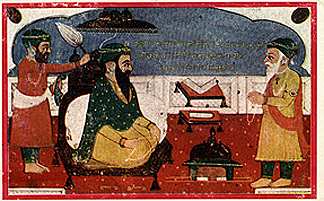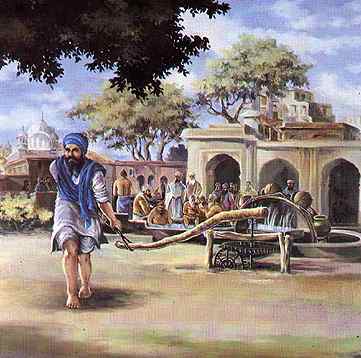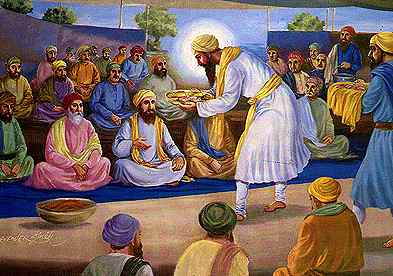|
|
|
|
|
|
|
|
|
|
|
|
|
|
|
|
|
|
|
Menu |
|
|
|
|
|
|
|
|
|
|
|
|
|
|
|
|
|
|
|
|
Bhai
Banno and his 'Bir' |
|
|
|
|
|
|
|
|
|
|
|
|
 |
|
|
|
|
|
|
|
Bhai
Banno being given the Adi Granth by Guru Arjan to get it bound |
|
|
|
|
|
Bhai Banno was the
son of Bishan Chand Bhatia of village Mangat of district Gujarat in Pakistan.
He became a faithful follower of Guru Arjan who involved him in the preparation
of the Adi Granth. It was written on loose sheets and it was decided to
get it bound in a beautiful hard cover at Lahore. Bhai Banno was entrusted
with the task of taking the manuscript to Lahore for the purpose. He took
Guru Arjan's permission to pass through his native village Mangat. It is
said that on the way he prepared another copy with slight variations from
the original. He extended the composition of Bhagat Surdas and included
a stanza by Mira Bai. Guru Arjan crossed out these additions and declared
that version as un-authentic. It is believed that this version is still
in possession of the heirs to Bhai Banno. This un-authorized version of
the Adi Granth is referred to in Sikh literature as Khari Bir (as it was
written in village Khaira) or Bhai Banno ki Bir. |
|
|
|
|
 |
|
|
Bhai
Banno belonged to village Khara, now called Mangat. When he came to know
that the pond of Ramsar was being built and the Holy Granth was to be compiled
by Guru Arjan Dev, he left his hearth and home, came to Amritsar and stayed
there for four years. He served the Guru with greatest devotion and in a
most unassuming manner. He would get up before dawn and draw water from
the well for the devotees' bath. He was called 'the dearest Sikh' by the
Fifth Guru. |
|
|
|
|
The
first copy of the original Holy Granth was also written under his personal
supervision, which was a stupendous task completed by him with great diligence
and devotion. |
|
|
|
|
|
|
|
|
|
 |
|
|
|
|
|
|
|
|
|
|
Bhai
Banno's services in the construction of Harimandir Sahib are significant.
On completion of Harimandir Sahib someone asked Guru Ji as to who should
be served the platter first according to the established practices. Guru
Ji said, "Whoever has done service everyday by remaining modest and
keeping his low profile." Guru Arjan Dev Ji honoured Bhai Banno by
placing the first platter of the feast before him. |
|
 |
 |
 |
 |
 |
 |
 |
 |
 |
 |
 |
 |
 |
 |
 |
 |
 |
 |





